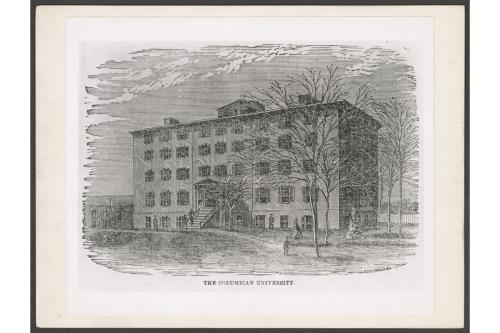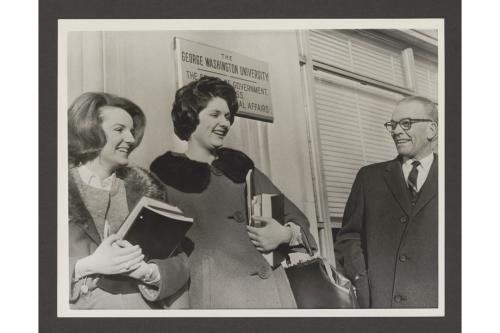Our History
For more than a century, the GW Political Science Department has attracted top scholars and students seeking to make their mark in the nation’s capital.
The department has grown from a handful of faculty and students to a robust program, frequently earning top national prestige for our academic programs and research.
Origins
Political science at GW traces its origins to the Department of Jurisprudence and Diplomacy, which offered graduate and professional studies in affiliation with the law school.
In its early days, the department employed three faculty members: Chair Charles Herbert Stockton, Leslie Cleveland McNemar and Oscan Phelps Austin. The faculty offered 14 courses, ranging from Elements of Political Science and American Government to European Governments and Principles of International Law.
The department's objective was to train students for consular and diplomatic positions and public service while teaching them to be engaged citizens.
Early History
Two periods of growth in the mid-20th century swelled the ranks of the Political Science Department faculty. The first occurred after World War II, when the department doubled from six faculty members to 12. The second began in the 1960s with a university-wide expansion that resulted in new units such as the Institute for Soviet Studies, the School of Public and International Affairs and the GW School of Business.
Throughout the 1980s, faculty began to discuss how to further set their program apart. Dissatisfied with other academic departments in the Washington, D.C., area that relied too heavily on the location as a replacement for top-notch faculty, curricula and research, they saw a window of opportunity. GW’s Political Science Department, they believed, should be able to compete with the top programs across the country, with the location serving as a bonus advantage.
To that end, the department recruited a new chair, Lee Sigelman, who brought an unsurpassed personal record of scholarly productivity and a clear vision of what was required. New faculty members were aggressively recruited and, once hired, encouraged to focus on their research and publication. An atmosphere of collegiality was nurtured, collaboration was encouraged and researchers published their work in top journals and academic presses. The program grew into a world-class producer of education and research.
A Timeline of Political Science at GW
1905
The first PhD in political science is granted by GW. Over the next two years, with the addition of undergraduate course offerings, the College of Political Sciences is born.
1913
Following a financial crisis, the College of Political Sciences is incorporated into Columbian College. It is renamed the Department of Political Science in 1914.
1928
The five-person faculty joins the new School of Government. Political science material becomes a requirement, with the goal to prepare men and women for public service.
1960s
A period of significant growth ensues as a result of scholarly productivity and a push to attract top faculty to the department.
1990
Lee Sigelman is named chair and begins building a research-conducive environment and encouraging faculty to collaborate on research.
2001
A survey by a team of international relations scholars at the College of William and Mary ranks GW's Department of Political Science 11th in the nation based on quality of incoming faculty.
2011
A Teaching, Research, and International Policy Project survey ranks the PhD program 15th in the nation.
2013
The Department of Political Science celebrates its centennial.
U.S. News & World Report ranks the department’s American Politics field 16th in the nation.




